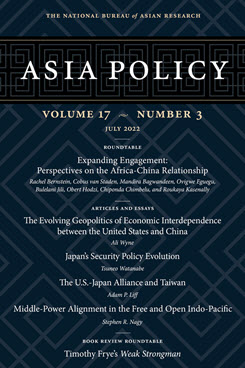The Evolving Geopolitics of Economic Interdependence between the United States and China
Reflections on a Deteriorating Great-Power Relationship
This essay explores why the United States and China have both come to adopt a more cautious view of globalization as their strategic frictions have intensified.
Note: This special essay was made possible by the generous support of the Hinrich Foundation.
Foreword to the Special Essay
We live in a world of instant communication, where globalization is intensifying in the digital realm. Yet we also live in a world where “deglobalization” is gaining traction in some policy circles. Self-sourcing or sourcing supplies only from like-minded countries—improbably referred to as “friend-shoring”—is openly encouraged. But we cannot so easily delink the supply chains that hold up our integrated global economy. Moreover, deglobalization is a privilege that most communities around the world cannot afford.
This Asia Policy special essay by Ali Wyne argues that the push for self-reliance is largely prompted by the world’s two giants in economic might and rivalry. Described by Wyne as “perhaps the two greatest beneficiaries” of globalization, the United States and China are now turning inward, primarily due to persistent and growing frictions stemming from their great-power competition. Efforts toward “decoupling” are having a knock-on effect on trading partners, particularly in Asia. Breaking up is hard to do, including for friends of the bickering couple. To many smaller and lower-income economies, the prospect of taking a side in the great-power rivalry comes with significant repercussions to their development trajectory and political positioning.
The Hinrich Foundation advocates for sustainable and mutually beneficial global trade. To this end, we greatly value analysis such as this special essay by Wyne that examines the nuances inherent in any developing issue. Wyne’s essay shows that beneath the simmering geopolitical tensions are stubborn incentives to globalize. If breaking up is harder than anticipated, Asian economies may welcome the respite. After all, they have been a key beneficiary of liberalization of trade and investment. And the United States and China face formidable challenges both in decoupling and in shaping the region to their own preferences. As Asia’s economies come into their own, perhaps as Wyne argues, neither Washington nor Beijing will be able to dictate the region’s economic evolution.
Dini Djalal
Associate Director – Editorial, Hinrich Foundation
EXECUTIVE SUMMARY
MAIN ARGUMENT
The U.S. and China were perhaps the two greatest beneficiaries of the phase of globalization that dated from roughly the mid-1970s to the 2008–9 global financial crisis. Now, however, each country assesses that a combination of intensifying domestic pressures and increasing external turbulence—in significant part the result of growing strategic frictions between the two states—is heightening the need for self-reliance. U.S.-China relations are poised to continue deteriorating as Washington and Beijing both take a dimmer view of their economic entanglement. That deterioration will shape but not dictate Asia’s economic evolution.
POLICY IMPLICATIONS
- The U.S. and China are both increasingly likely to see their economic interdependence not as a source of stability but as a vector of vulnerability.
- Even so, the rhetoric around decoupling presently outpaces the reality; the U.S. and China will likely find it far more challenging to unwind their interdependence than they would like.
- The extent to which the Indo-Pacific Economic Framework succeeds in shoring up U.S. economic competitiveness will be a crucial litmus test of Washington’s staying power in Asia.
Ali Wyne (United States) is a Senior Analyst with Eurasia Group’s Global Macro-Geopolitics practice and the author of the new book America’s Great-Power Opportunity: Revitalizing U.S. Foreign Policy to Meet the Challenges of Strategic Competition (2022).
About Asia Policy
Asia Policy is a peer-reviewed scholarly journal presenting policy-relevant academic research on the Asia-Pacific that draws clear and concise conclusions useful to today’s policymakers. Asia Policy is published quarterly in January, April, July, and October and accepts submissions on a rolling basis. Learn more


